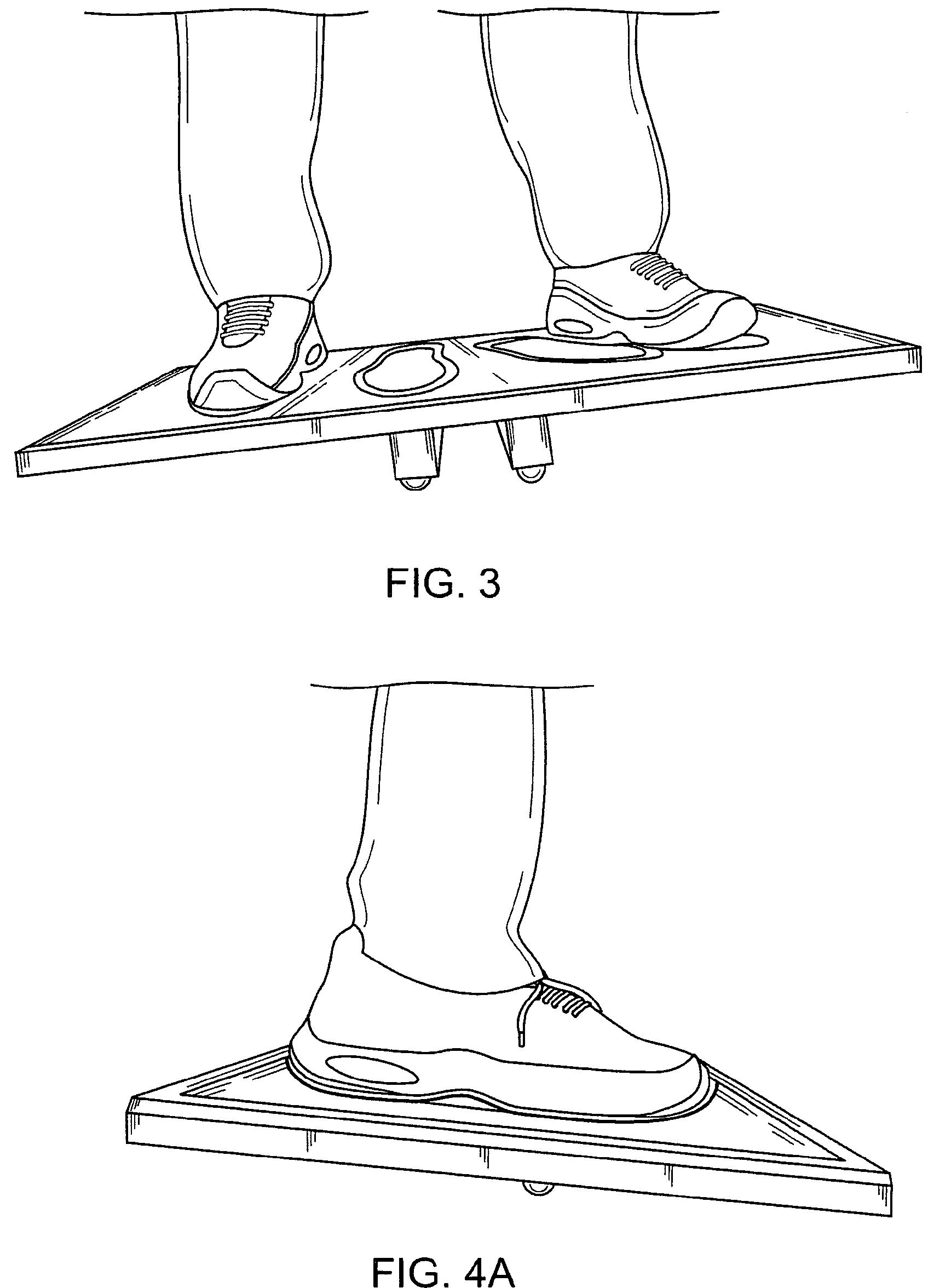Having Trouble with a Balanced Swing? This Invention May Help
This summer I was fortunate to attend a long drive / trick shot demonstration by “professional long driver and golf entertainer” Tom Roskos. The guy is amazing; just try hitting a ball like THIS someday. Much of his demonstration involves amazing feats of balance, including hitting long drives while balancing on top of an exercise ball. For those of use with more human skill levels, the following invention may help out. What do you think?

The drawings come from USPN 7625294 titled “Golf Swing Power Shift Board,” which explains:
The inventors developed a simple training aide that can be positioned easily to work on different aspects of weight transfer and body alignment associated with the different types of golf swings. In addition, this training aide will develop the body balance required to execute various shots on the course (e.g. uphill lies, ball below the feet, etc.). These various swings need to be consistently repeated to gain a better understanding of the game. The understanding of body movement and weight transfer will lead to lower scores and more enjoyment of the game.
The Golf Swing Power Shift Board GSPSB was designed with physical conditioning in mind to achieve a repeatable, balanced, sequential and efficient, yet powerful, golf swing. It can be used year round indoors and outdoors. The GSPSB is similar to physical therapy balance boards that assist patients by strengthening the muscles associated with proper body balance, but it is specifically designed to fit the needs of the golfer. It can be used for golf swing physical training with all standard golf clubs, weighted golf swing training clubs, medicine ball, and other light weight training devices (Examples 5, 6, 7 & 8). It comes in various sizes to meet the height and weight requirements of various golfers of all ages.
Proper use of the GSPSB on a regular basis will assist the golfer with the most difficult move of the golf swing–the transfer of weight towards the target on the downswing. This weight transfer is also called the “power shift” The primary function of the GSPSB is to condition the golfer’s mind and body to efficiently store and release the 321 “torque” that is created from a smooth, rhythmic, and sequential weight transfer–the key to a powerful swing. The release of torque naturally occurs at the completion of his/her back swing when the golfer shifts his/her weight to the front foot and pivots around the front leg just prior to the completion. The power shift to the leading leg, then the rotation of the body starting with the left foot, knee, upper leg (especially the hamstrings, buttocks, and abdominal muscles), shoulders, arms, hands and club turning toward the target at the completion of the back swing releases the coil that was produced during the back swing that produced the initial weight shift onto the back leg.
Weight transfer is not only important to a proper and powerful golf swing, but it is used in baseball by batters preparing to swing at a pitch. As the batter lifts the heel and/or entire foot off the ground facing the pitcher, weight is transferred to the back leg. When the batter plants the same foot back down to the ground, his body weight is transferred towards the target and that movement initiates the rest of the swing. Baseball pitchers also use weight transfer to assist with the coil that is needed to produce a 100 mph pitch. A similar motion is made in tennis when an aggressive forehand swing is made. The weight transfers to the leg facing the net and the hips and torso rotate to the target followed by the arms to completely transfer the weight to the front side. The coil is the key component to gain torque.
By utilizing the Foot Positioning Templates (FPT) that accompany the GSPSB, the golfers can also work on the body balance associated with full shots, pitch shots, chipping, draw and fade shots. In addition, the combination of Height Adjustable Risers (HAR) will enable the golfers to practice a variety of golf shots (e.g. uphill and downhill lies, as well as side hill lies when the ball is above and below the feet).
Looks like it would be worth a try.
Dave Dawsey – Tracking Golf Training Patents
PS – click HERE to check out interesting putter posts
